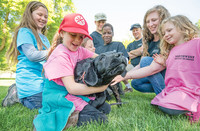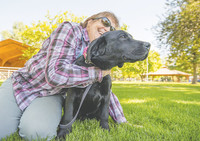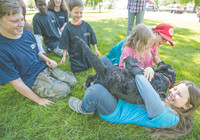Clear, 39° F
After eight years in the Army and 365 days of combat in Iraq, former infantryman Aaron Swaney now has another assignment. This time, they are cuddly puppies.
Swaney, his wife Abby and their seven …
This item is available in full to subscribers.
The Powell Tribune has expanded its online content. To continue reading, you will need to either log in to your subscriber account, or purchase a subscription.
If you are a current print subscriber, you can set up a free web account by clicking here.
If you already have a web account, but need to reset it, you can do so by clicking here.
If you would like to purchase a subscription click here.
Please log in to continue |
|



After eight years in the Army and 365 days of combat in Iraq, former infantryman Aaron Swaney now has another assignment. This time, they are cuddly puppies.
Swaney, his wife Abby and their seven children are the newest foster family for Northwest Battle Buddies, the nonprofit organization provides service dogs to veterans fighting traumatic brain injury and post traumatic stress disorder (PTSD). When the Swaneys met Cipher, a 3-month-old English lab, it was love at first sight.
The Swaneys gathered at Washington Park on Tuesday to wait for Jona Vanata, puppy foster representative for the organization. When she opened the door to her car, Cipher leapt into the arms of all seven of the Swaney kids. The children rolled in the grass, welcoming the affectionate puppy. There were a lot of puppy kisses being handed out by the energetic pup.
Aaron is motivated by the experiences he had fighting in Iraq.
“You lose guys. It’s emotional,” he said. “I don’t have PTSD but I understand their battle. I just want to do what I can to help.”
The Swaneys will serve as a foster family for Cipher until he’s ready to begin training. Each new service dog undergoes more than 350 hours of professional training before being teamed up with a veteran. The first part of their training starts right here in Powell at Triple A Dog Training. Chris Walker, brother of Northwest Battle Buddies founder Shannon Renee Walker, is the owner of Triple A.
“In 2007, a veteran walked into Shannon’s kennel and wanted a service dog trained to help him with his PTSD,” Walker explained. “When Shannon saw the change in the man’s life, she founded the organization knowing there was a need.”
Walker is currently training nine dogs, but that number will grow to 15 before the end of the year. After the dogs go through four to five months of training in Powell, they are transported to Battle Ground, Washington, to finish their training. The service animals need to be trained in every aspect of daily life — training not possible in Powell.
“There’s only one escalator in the entire state of Wyoming,” Walker said.
The dogs go through extensive training in public situations, including going through security at airports. The TSA has teamed up with Northwest Battle Buddies to help train their employees on how to work with service animals.
“It is a mutually beneficial partnership,” Walker said.
Linda del Toro picked up her second Battle Buddies foster puppy Tuesday. She previously had an English Cream golden retriever for five months.
“I have a diabetic alert service dog and I know what it means to people. So if I can help some veterans, I am willing to jump in with both feet,” del Toro said.
The hardest part of the job for del Toro was letting her foster pup go.
“You get attached. But knowing where he was going and what he was going to do overrode my emotions,” del Toro said.
The need for service dogs is much greater than the supply. Before Walker started the group’s second training facility there was a three-year waiting list.
“Some of the veterans didn’t make it while waiting for their Battle Buddy,” Vanata said.
The suicide rate for veterans is more than double the rate of non-veterans, according to data collected by the federal National Vital Statistics System.
The waiting list is still long, but is now just over a year. Northwest Battle Buddies is looking for volunteers to be foster families. Vanata said they have three litters of golden retrievers coming soon and need as many volunteers as they can find.
“Our motto is, ‘Serving our veterans who served us all.’ We’re in a constant search for volunteers,” Vanata said.
Foster families are responsible for some basic obedience training, but mostly serve to socialize the puppies.
“We want the dog to come into their space, to be right with them on the couch or in the bed, to be in their space constantly so they’re socialized to always want to be with somebody,” Vanata said. “They [the dogs] will end up being in a relationship so tight with the veterans that they’ll be able to know when [the veteran] is having an anxiety attack, or wake them when they’re having night terrors.”
The group is also looking for donations of ‘soft breed’ puppies to undergo training. For more information on volunteering or making a donation, call 360-601-9744. Combat veterans wanting to apply for a Northwest Battle Buddies service dog can find applications online at www.northwestbattlebuddies.org.